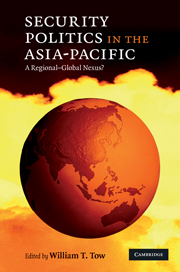Book contents
- Frontmatter
- Contents
- List of illustrations
- About the contributors
- Preface
- Acknowledgements
- List of abbreviations
- 1 Setting the context
- Part I
- 2 Grappling with an elusive concept
- 3 Asia-Pacific institutions
- 4 The United States: regional strategies and global commitments
- 5 A rising China and American perturbations
- Part II
- Part III
- Part IV
- References
- Index
2 - Grappling with an elusive concept
Published online by Cambridge University Press: 05 June 2012
- Frontmatter
- Contents
- List of illustrations
- About the contributors
- Preface
- Acknowledgements
- List of abbreviations
- 1 Setting the context
- Part I
- 2 Grappling with an elusive concept
- 3 Asia-Pacific institutions
- 4 The United States: regional strategies and global commitments
- 5 A rising China and American perturbations
- Part II
- Part III
- Part IV
- References
- Index
Summary
The term ‘Asian century’ has become a shorthand expression to conjure the rise of Asia in absolute and also, but more subtly, in dynamic and relative terms (see Abramowitz and Bosworth 2006; Sachs 2004). Not only are Asian states seen as increasingly important actors in international relations, but Asia is viewed as the regional theatre in which many of today's critical security dilemmas are being played out. Thus, to invoke a second, oft-repeated phrase: the global ‘centre of gravity’ is seen as shifting towards Asia. Just how far, how fast and how consequential any such shifting may be is a central question of this volume. Stated more specifically, it is concerned with how Asian security politics affects international systemic structures and events, and vice versa. This process is, in turn, driven by both material and non-material factors that will be decisive in shaping what type of world will emerge over the next few decades.
This volume has set itself the challenge of capturing the essence of the ‘global–regional nexus’. William T. Tow has set the stage in chapter 1 by embracing Muthiah Alagappa's vision of this term: ‘a concept that captures the mutuality of interaction between actors and processes at the two levels’ (Alagappa 2006). This chapter concentrates on the conceptual and theoretical features of Asian state relationships rather than on their more descriptive aspects.
- Type
- Chapter
- Information
- Security Politics in the Asia-PacificA Regional-Global Nexus?, pp. 31 - 48Publisher: Cambridge University PressPrint publication year: 2009
- 3
- Cited by

